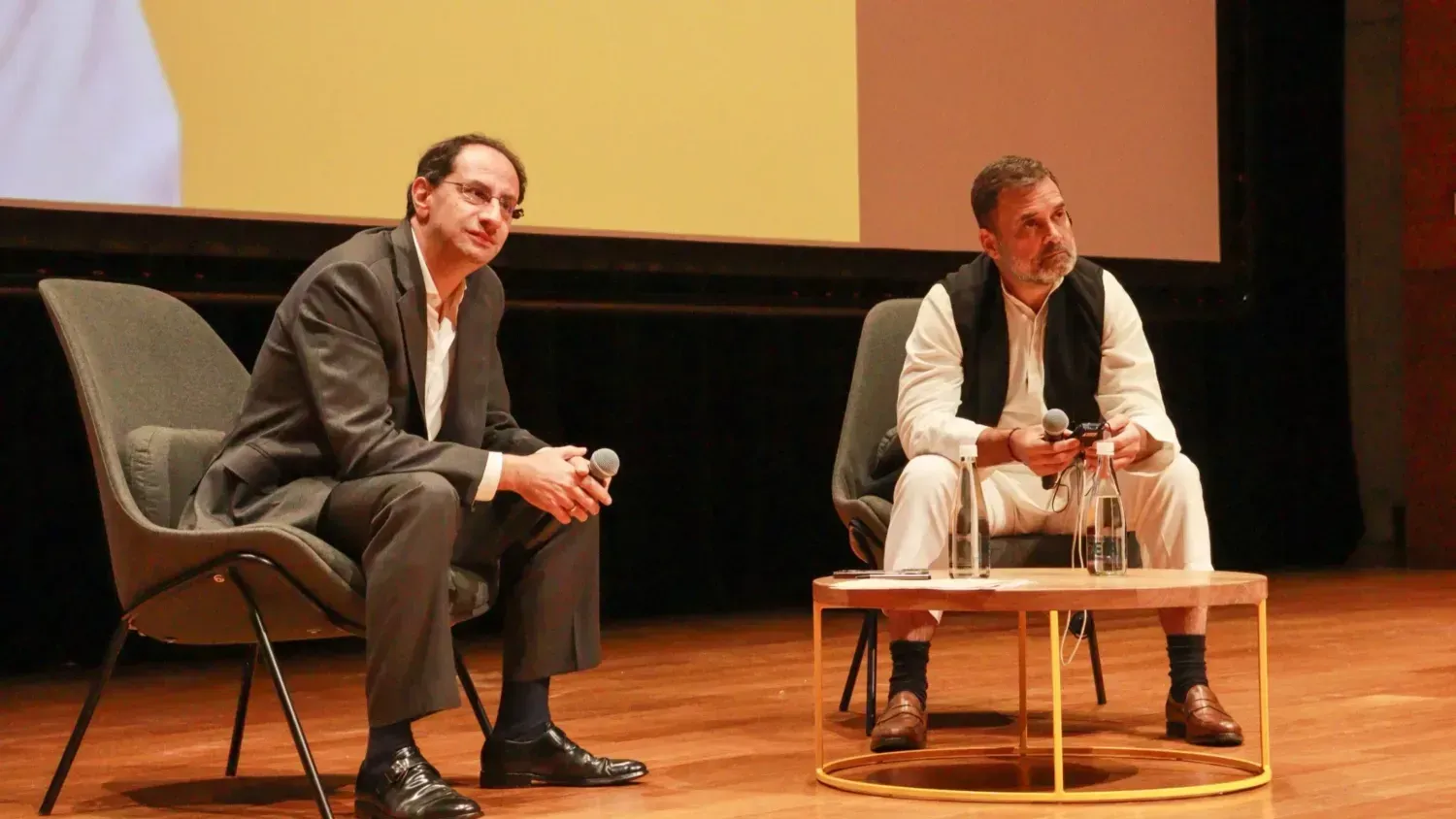Rahul Gandhi in Colombia: Democracy Debate Sparks Political Storm Back Home

Congress leader Rahul Gandhi, currently on a four-nation tour of South America, has once again ignited a major political storm with his comments abroad. Speaking at EIA University in Colombia, Gandhi alleged that India is witnessing a “wholesale attack on democracy” under the Narendra Modi-led BJP government. His remarks touched upon governance, the role of the RSS, economic development models, and global challenges like the rise of China in the renewable energy sector.
While his statements found resonance with sections of the academic audience and supporters, they also drew sharp criticism from the BJP, which accused him of “defaming India on foreign soil.” The controversy has now become a central talking point in India’s political discourse.
What Rahul Gandhi Said in Colombia
At the seminar in Bogotá, Rahul Gandhi made a series of pointed remarks:
On Democracy in India: He claimed that India’s democratic system is under its “gravest threat” since independence, alleging that dissent, free speech, and institutions are being systematically suppressed.
On BJP-RSS Ideology: Gandhi described the BJP-RSS worldview as rooted in “cowardice,” adding that their politics thrives on fear, division, and cronyism.
On India vs China: He warned that China is outpacing India in the renewable energy race, calling it a national security challenge. He said, “The Chinese are winning so far; India must wake up.”
On Indian Companies Abroad: Interestingly, Gandhi praised Indian manufacturers like Bajaj, Hero, and TVS for performing well in Colombia, adding that India’s true strength lies in innovation, not crony capitalism.
On Values: He emphasized that India should compete globally by prioritizing its values of diversity, inclusivity, and innovation rather than authoritarian methods.
BJP’s Counterattack
The BJP wasted no time in slamming Rahul Gandhi. Leaders across the spectrum—union ministers, party spokespersons, and even allies like actress-turned-MP Kangana Ranaut—hit back hard.
Union Ministers’ Statements:
CR Kesavan accused Rahul Gandhi of deliberately trying to defame India on international platforms.
Arjun Ram Meghwal said it had become a “habit” of Rahul Gandhi to insult India abroad.
BJP Spokespersons:
They labeled him the “leader of propaganda.”
Party voices described his remarks as “anti-India,” “disgraceful,” and “an insult to freedom fighters.”
Kangana Ranaut’s Reaction: Ranaut, who is both a BJP MP and a cultural icon, called Rahul Gandhi a “disgrace” and accused him of “maligning India’s image wherever he goes.”
Congress and Allies Defend Rahul
While the BJP sharpened its attack, the Congress and some opposition leaders defended Rahul Gandhi’s comments.
Congress Defense: Party leaders argued that Gandhi was merely stating facts about the current political situation and drawing global attention to the erosion of democratic values.
Adhir Ranjan Chowdhury: He said, “What he is saying is about what is happening in our country.”
Uddhav Thackeray’s Shiv Sena (UBT): However, Rahul’s jibes at Savarkar and RSS caused discomfort for ally Sena, as Savarkar remains a revered figure in Maharashtra.
Key Themes of the Debate
1. Democracy vs Image Abroad
The BJP argues that criticizing the government on foreign soil weakens India’s global image. Rahul Gandhi, however, maintains that safeguarding democracy is above optics.
2. China as a Warning Signal
Rahul’s warning that “China is winning the renewable energy race” highlights his attempt to link democratic strength with national security.
3. Cronyism vs Innovation
By praising Bajaj, Hero, and TVS, Gandhi stressed that India’s future lies not in monopolistic policies but in nurturing innovation-driven businesses.
4. Ideological Battle
His sharpest attack was reserved for the RSS ideology, which he accused of being “cowardice at its core.” This continues his long-standing narrative against the Sangh.
Global Audience, Domestic Fallout
While Gandhi’s South America tour was designed to build goodwill with students, academics, and leaders, the domestic political impact has overshadowed the diplomatic outreach. His remarks have not only triggered BJP’s backlash but also deepened the debate on whether opposition leaders should air India’s internal issues abroad.
Public Perception
Supporters’ View: Many see Rahul Gandhi’s candor as necessary to highlight what they believe is an erosion of institutions and freedoms.
Critics’ View: Others accuse him of undermining India’s global standing for political gains.
On social media, the debate is split: hashtags like #DemocracyUnderAttack and #RahulDefamesIndia are trending simultaneously.
Conclusion
Rahul Gandhi’s Colombia remarks have once again spotlighted the tug of war between image and reality in Indian politics. His assertions about democracy, innovation, and China are gaining traction among his supporters, but the BJP’s counteroffensive has turned it into a high-voltage political flashpoint.
Whether Gandhi’s words resonate with voters back home or backfire as “foreign soil politics” remains to be seen. But one thing is clear: as India approaches another election cycle, the battle over democracy and governance narratives is set to intensify.
Press Release on Our All Websites for Powerful Online Presence
Get your brand featured with a world-class press release, published across all our high-authority websites — complete with powerful do-follow backlinks. Crafted to meet global press release standards, our service ensures maximum credibility, visibility, and SEO impact. Special pricing and exclusive offers are available for a limited time. Contact us today at sunil@justbaazaar.com to elevate your brand’s presence."
Created with © systeme.io









